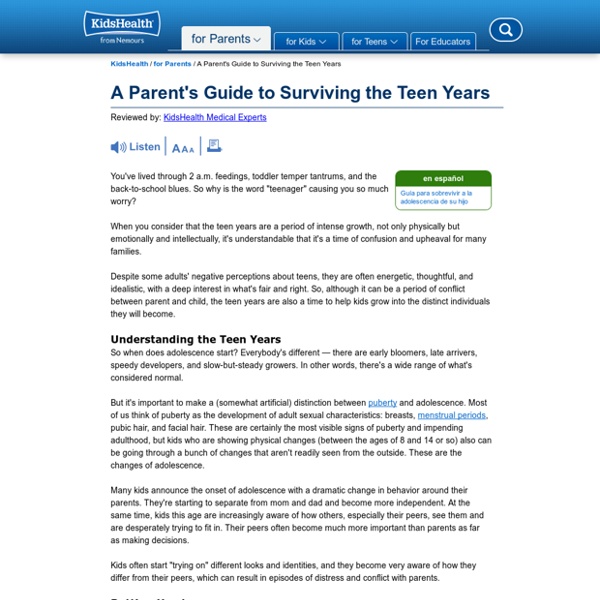A Parent's Guide to Surviving the Teen Years

https://kidshealth.org/en/parents/adolescence.html
Related: How Reinforcement And Punishment Can Help Parents In Influencing The Behavior Of Teenage Children
• sittihaifah001
• Using Reinforcements and Punishments to guide Teenagers
• Using Reinforcement and Punishment to influence the behaviour of Teenagers
• Parenting Guide for Teenagers
12 Essential Tips for Positive Parenting Your Teen!herishing your Baby
Positive parenting a teenager? A terrific teen who's responsible, considerate, shows good judgment, at least most of the time? Yes, it is possible! Here's your game plan, with 12 essential Tips. You may not feel like you have much influence on your child these days, but teens’ behavior is highly correlated with the strength of their bonds with their parents.
Parenting skills: Tips for raising teens
Parenting skills: Tips for raising teens Helping an adolescent become a caring, independent and responsible adult is no small task. Understand the parenting skills you need to help guide your teen. By Mayo Clinic Staff
Parenting Children with Positive Reinforcement (Examples + Charts)
Children don’t come with instructions and discipline is often experienced by parents and children alike as an arena where our will and wits are tested. Positive reinforcement is only one of many forms of discipline, but from the perspective of positive psychology, it may as well be the most important one as it focuses on amplifying what is already good in our children and in ourselves as their caretakers. Positive reinforcement as a form of positive discipline allows us to tap into our children’s individual strengths, draw attention to their personality traits and interests, and as a result give us an opportunity to connect, communicate effectively, and ultimately empower them to be more of themselves.
Negative Reinforcement and Operant Conditioning
Did you know that parents could train their children to act defiant? “Who in their right minds would do that?” you may wonder. Well, many of us actually do. Find out how a lot of parents unknowingly train their children in rebellion using negative reinforcement. Behavioral psychologist, B.F.
Positive Punishment: What It Is, Benefits, and Examples
Positive punishment is a form of behavior modification. In this case, the word “positive” doesn’t refer to something pleasant. Positive punishment is adding something to the mix that will result in an unpleasant consequence. The goal is to decrease the likelihood that the unwanted behavior will happen again in the future.
How Negative Punishment Works
Negative punishment is an important concept in B. F. Skinner's theory of operant conditioning. In behavioral psychology, the goal of punishment is to decrease unwanted behavior.
Negative Punishment Examples and Scenarios
Nobody ever wants their stuff taken away. That is the main concept behind negative punishment. Using negative punishment example scenarios, gain an understanding of the concept and its effectiveness.
Related:
Discipling your child using Reinforcement & Punishment
•
Teenagers and their quest for identity - Explained with Erikson's theory of life development.
•
The Period of Adolescence and its Developmental Features



